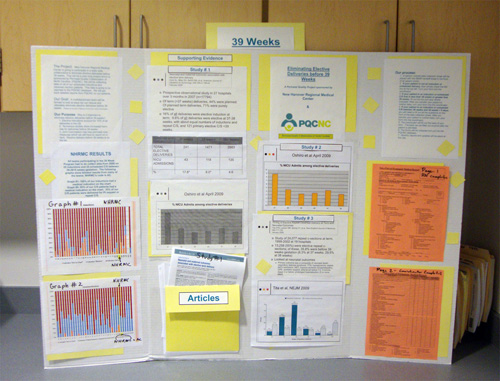Updates
Representatives from about half of the teams in the 39 Weeks Project attended the PQCNC annual meeting in Chapel Hill and had an opportunity to exchange ideas during “town meeting” sessions. Five teams prepared storyboards, protocols or other examples of their work on 39 weeks to share at the meeting. For more information about the meeting, click here. At the monthly webinar/conference call, teams discussed data definitions to ensure consistency across sites and possible approaches to using data to effect changes in practice.

36 of 38 teams who were eligible for October data collection have submitted data. The two new teams will submit November data. While PQCNC is available and delighted to meet with hospitals not currently involved in the 39 Weeks Project to support work to eliminate elective delivery before 39 weeks, no additional sites will be added to the existing collaborative. However, all are encouraged to attend the PQCNC annual meeting in Chapel Hill on December 3.
During this month’s webinar/conference call, the team from Pitt County Memorial Hospital shared changes they have made in their labor and delivery processes, staffing and structure to improve throughput and reduce scheduled deliveries that are not medically indicated before 39 weeks.
PQCNC staff attended the March of Dimes Symposium on Quality Improvement to Prevent Prematurity in Washington, DC this month, where scheduled delivery before 39 weeks was a key topic. 39 Weeks initiatives are underway around the country in statewide quality improvement collaboratives, within large hospital systems, through private health plans, and across communities, such as the Healthy Babies are Worth the Wait project sponsored by the March of Dimes in Kentucky.
North Carolina March of Dimes continues to be an important partner in PQCNC’s 39 Weeks Project. The brochure Why the Last Weeks of Pregnancy County are being made available free of charge to all participating sites. Please contact PQCNC for more information about obtaining these brochures through the March of Dimes.
At the learning lab, the group reviewed a summary of the “lookback” data collection they completed in August of charts from 2008, which suggests that approximately half of the scheduled c-sections between 36w0d and 38w6d were repeat low transverse c-sections with no other indication for delivery. Most inductions had some indication for delivery, although many did not meeting the criteria by the PQCNC expert panel for that indication. There was great variation among the hospitals, with some having virtually no elective deliveries <39 weeks while at others the majority of scheduled deliveries at this gestational age did not have a medical indication.
Each team received a report of the retrospective data from their individual hospital, which guided their work on the draft action plan. Teams will now go back “home” to share the draft action plan with the stakeholders they identified as important contributors to their 39 weeks work. They will discuss potential changes to test and will prepare to start collecting data on all scheduled deliveries between 36w0d and 38w6d starting on October 1.
We are looking forward to formally starting our work together as a collaborative. With 37 hospitals participating, this project has the potential to result in major improvement in outcomes for mothers and babies.
- Wednesday September 16 at the Hawthorne Inn in Winston Salem
- Friday September 18 at the Sheraton in Chapel Hill
- Both days start with registration/continental breakfast at 8:30. The meeting will begin promptly at 9am and end 4:30pm.
- Lunch and afternoon snack will be provided, and coffee/tea will be available throughout the day.
What to bring:
- Your team, including your physician champion, nurse champion, and hospital administrator.
- Please dress comfortably and in layers.
What to expect:
- There will be brief lectures, but a significant amount of time will be devoted to your team working together to develop goals and an action plan to eliminate elective deliveries before 39 weeks.
- Teams will also have time for open discussion of the results of the "lookback" chart review and of possible strategies and challenges to expect when testing changes related to scheduled deliveries.
35 hospitals have joined the collaborative and are busy completing their "lookback" data collection during the month of August. Each hospital will abstract data from 25 scheduled c-sections and 25 inductions done at gestational ages between 36-38 weeks. Reports based on this data will be prepared for each hospital in time for the September learning sessions, and all hospitals in the collaborative will be able to look at all of the data from across the state, blinded to the names of the individual hospitals. The August 3 webinar reviewed data collection methods and the definition for each variable being studied, to ensure uniformity of the data across hospitals.
The 35 teams participating in the collaborative represent a diversity of hospitals, from small rural hospitals to large academic medical centers, and from hospitals that have been working independently to eliminate elective deliveries before 39 weeks for years to those that are just beginning to look at this issue. Team members include nurse managers, chiefs of OB departments, community obstetricians, maternal-fetal medicine specialists, staff nurses, nurse educators, performance improvement managers, chief nursing officers, chief operating officers, risk managers, and patient care coordinators.
Monday August 3, 3-5pm
At this webinar, we will review how to complete the retrospective data collection. Each hospital will abstract data from 50 charts using a tool developed by PQCNC and enter the data using a web-based data entry program. Information about how to access the webinar will be distributed to teams who register in an email. The only person required to participate in this session is the person who will be responsible for chart abstraction/data entry, but all team members are welcome.
Action Learning Lab:
Wednesday September 16, 9-4:30 at The Hawthorne Inn in Winston Salem, NC.
Friday September 18, 9-4:30 at the Sheraton in Chapel Hill, NC.
This one-day session will be held twice. Each hospital should attend one session; please select whichever session is more convenient. All members of the team need to be present for this session. At the learning lab, the evidence base for the elimination of elective deliveries before 39 weeks will be reviewed, information about quality improvement science will be presented, and the process for ongoing data collection will be reviewed. There will be time set aside for teams to work individually to develop an action plan for each hospital. Presenters will include staff from hospitals who have done quality improvement projects on this topic and a patient panel to offer the patient perspective on the value of this work.
